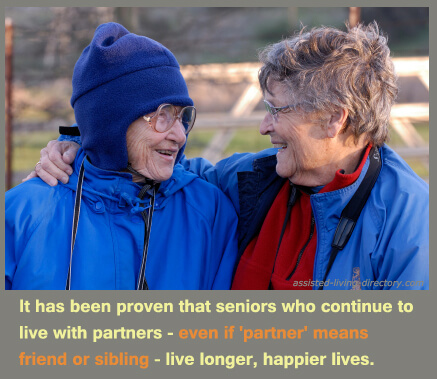No Home for Elderly Friends or Siblings in Assisted Living?
No Home For Elderly Friends or Siblings?

Summary: Married couples can often times live together in an assisted living or senior care envorinment, but what about friends, or siblings. Unfortunately, this arrangment has not been embraced or welcomed by many facilities, which is unfortunate. Despite the difficulties of balancing the care of two people who have different needs, it has been proven that seniors who continue to live with partners live longer, happier lives.
Author: Jayme Kinsey exclusively for Assisted Living Directory. Jayme is a freelance writer with over ten years experience caring for the elderly and mentally disabled adults.
Jayme is a contributor for Assisted Living Directory
Caregivers are incredible people. Lillian came to the nursing home in a fit of tears. She was quickly sedated and settled into her new room. Only weeks ago she had been diagnosed with dementia, the signs of which were noted by her best friend and roommate, Mary.
Mary and Lillian had been sharing a home since Mary’s husband passed away seven years before. They had been best friends before then, and during the past few years, they had become each other’s life and soul. They couldn’t have been closer if they had been twins.
Although Lillian’s dementia was early stage, her family decided that Mary was not capable of providing adequate care. Mary asked whether or not they could enter a nearby assisted living facility together. Lillian’s family brushed the request off and Lillian was placed in an nursing home.

Separated, both women began to show signs of depression. Lillian refused to eat. She cried. She fought with the staff. She was labelled as a troublemaker.
Mary became unkempt. She no longer bothered to clean house or cook meals. Three months after Lillian was taken from her, Mary slipped on the ice and broke a hip. She was placed in the same nursing home for therapy. For awhile, both women were ecstatic, and even though they didn’t room together, they spent every waking moment in one another’s company.
Too soon, Mary had to leave. She didn’t require skilled nursing, but her family felt she needed some supervision. She was moved to the assisted living facility. Lillian’s family refused to consider moving their mother. No longer able to visit each other, both women’s health declined rapidly, and Lillian passed away before a year was over.
Today, more and more assisted living facilities are recognizing the benefits of allowing couples to share living quarters. Despite the difficulties of balancing the care of two people who have different needs, it has been proven that seniors who continue to live with partners live longer, happier lives.
Sadly, this is where the acknowledgement of personal relationships ends. After hearing of Lillian and Mary’s experience, I researched online and found nothing about the importance of sustaining friendships between elders. I found no examples of elderly friends being allowed to live together in Long Term Care facilities.
Surprisingly, there was also no information on elderly siblings. In fact, if you search the keywords “elderly” and “siblings” you will find pages of advice for how to negotiate with YOUR siblings over your parent’s care. There is even less information on transitioning friends to shared living quarters.
A chat with a local assisted living facility provided some perspective. The administrator revealed that even though they had never been approached about the possibility of two friends or two sibling sharing rooms, it was not impossible.
In fact, she reasoned that if seniors opted to move in together as roommates and split the cost, it would ease financial issues for both. Just like it did for Mary and Lillian when they shared a home.
Still, that arrangement isn’t necessarily going to be met with enthusiasm by some relatives. If family members are helping to pay the cost of assisted living, they may resent the idea of splitting the cost regardless of the emotional benefits for their loved one.
Also, they may prefer their mom or dad be relocated to a facility closer to them. It can be even more complicated with elderly siblings, each with children of their own who don’t want to care for an aging aunt or uncle as well as a parent. And of course, it may simply not be medically feasible in some situations.
Whether a family is faced with the decision to separate spouses, siblings or best friends, they should take into account the impact of the emotional bond. When possible, a continued shared living arrangement should be considered, even if that means hiring an in-home caregiver. When this is no longer an option, there are steps that family can take to ensure that the change is not too heartbreaking or disruptive for their elderly loved one:
*Look for an alternative–In another case, a man and wife were forced to separate after the wife suffered a stroke. The man, still in good health, placed her in a local nursing home that had a unique arrangement for this area. They provided apartments on the grounds for relatives and spouses to rent. Although they did not room together, and he was not a resident, during the day their time could be split between his apartment and the facility.
*Arrange visitation–In Lillian’s case, her family’s decision to use a local nursing home allowed Mary to visit her frequently. Unfortunately, after Mary was moved to assisted living, she was no longer able to visit. This had a negative impact on both women.
*Encourage Correspondence--help the elderly to make phone calls and to read and write letters. Just being “in-touch” with their friends can improve their quality of life.
As relatives, caregivers and guardians of our elders, it isn’t easy to think of everything when managing their care. We take care of all the legal and clinical aspects, but sometimes forget the human aspect. It is already hard enough for the elderly to lose their health, independence and familiar surroundings. In Lillian’s case, it was devastating that she also lost her best friend.
It might not always be possible to arrange for two people to continue to live with or near each other. Yet, the emotional outcome is one of the many reasons that caregivers and other advocates of the elderly should always seek out and encourage new and innovative solutions for long term care, and never assume that traditional is always better.
Copyright © 2013 by Jayme Kinsey
– Article by Jayme Kinsey exclusively for Assisted Living Directory
Responses to this article:
David Wrote:
In all the time over the years in this industry, I don’t think I have ever seen a facility advertise that they accept friends, or siblings, or unmarried couples. I think it’s about time that this were welcomed, embraced, and more mainstream.
12 November 2013 at 10:53 am
No Obligation
Assisted Living with No Home for Elderly Friends or Siblings in Assisted Living?



